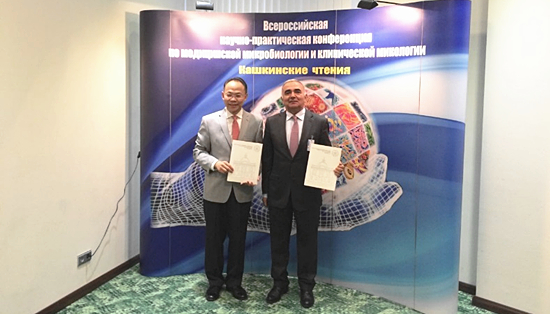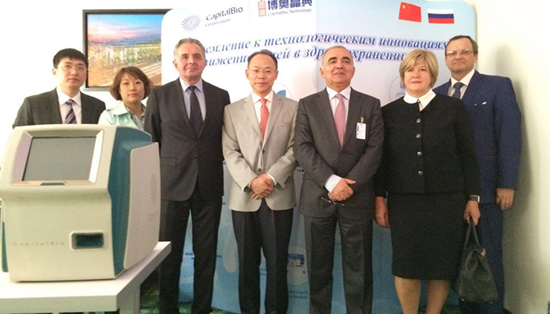China and Russia co-develop the world's first chip for fast detection of pulmonary fungal infection
The world's first disk-type microfluidic chip for multi-fungus nucleic acid tests, co-developed by Russia's North-Western State Medical University named after I.I. Mechnikov and China's CapitalBio Corporation, was delivered to Russian technicians on March 1 after seven days of transport, and officially entered into the experimental verification process.
"This fast and effective means of detecting fungal infections is of great technological significance," said N.V. Vasileva of the Kashkin Research Institute of Medical Mycology at the Russian university.
"It can help identify pathogenic fungi quickly so that patients can get timely treatment, thus significantly lowering mortality rates attributable to fungal infections and cutting medical bills. Besides Russia and China, other countries and regions will also benefit from this technology," added Vasileva.
According to Vasileva, more than one billion people in the world suffer from fungal infections, and the number of deaths caused by invasive fungal infections is approximately the same as those by pulmonary tuberculosis each year. In Russia, the number of patients with severe and chronic fungal infections exceeds 3 million, of which more than 460,000 suffer from fungal infections in their lungs.

CapitalBio President Cheng Jing poses with the president of Russia's North-Western State Medical University named after I.I. Mechnikov, after agreeing to cooperate on a joint research program during a China-Russia medical annual exchange event.
"As clinicians lacked the awareness of the disease as well as effective diagnostic methods, what we saw was just a tip of the iceberg," warned the professor. "In particular, patients with blood disorders and HIV/AIDS and those who have received an organ transplant will only have to wait for death if they don't get timely diagnosis and treatment after their lungs are infected by fungi."
The nucleic acid test and analysis platform for pathogenic organisms in the respiratory tract developed by CapitalBio drew the attention of Professor Vasileva at a China-Russia medical exchange event in April 2016. He and CapitalBio President Cheng Jing then agreed to develop a fast detection product for lung fungi on the disk-type microfluidic chip technological platform.

CapitalBio President Cheng Jing poses with professors from Russia's North-Western State Medical University named after I.I. Mechnikov.
"It may be the first attempt in the world to develop a product for fast detection of lung fungi on a molecular diagnostic platform," said CapitalBio's Zhang Yan, PhD. "Chinese and Russian researchers conducted all-round communication and worked together to overcome many technological problems."
Inadequate positive samples became the first bottleneck in the research. After the two sides signed the cooperation agreement in June 2016, Russian researchers provided CapitalBio with more than 50 positive fungal nucleic acid samples, which were shipped to China after getting special approval from the president of the Russian university and customs.
"It was amazing!" said Zhang. "Russia has abundant fungus strain resources from the clinical front and the abundant samples will significantly shorten the program schedule."
At the end of June 2016, Zhang and his team began their three-month-long research at CapitalBio's headquarters in Beijing. A prototype was rolled out in October.
Thanks to concerted efforts from both sides and professional competence, the team worked out a perfect solution after months of hard work.
"Currently, we're conducting experimental verification of the chip and supporting systems delivered by CapitalBio," said Vasileva. "Our testing engineers were impressed by the CapitalBio systems' technological sophistication and convenience. Notably, the 'lab on microchip' theory provides a unique method for miniaturization of devices and minimization of materials to be studied."

 Facebook
Facebook WeiXin
WeiXin CONTACT US
CONTACT US










 Tsinghua Holdings works hard for better ecological environment
Tsinghua Holdings works hard for better ecological environment